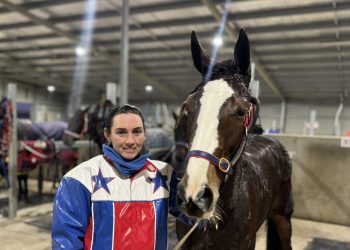East Rutherford, NJ – After a long campaign by New Jersey interests to legalize betting on sporting events, the United States Supreme Court today handed down an historic decision on the case of Murphy, et al. v. National Collegiate Athletic Association (NCAA), et al. to strike down a 25-year old federal law known as the Professional and Amateur Sports Protection Act (PASPA) that had prohibited sports betting outside the state of Nevada.
Leading the way through the nearly seven year battle has been Dennis Drazin, CEO of Darby Development, LLC which operates Monmouth Park, along with the New Jersey Thoroughbred Horseman's Association.
The New Meadowlands Racetrack contributed by funding half the cost of the Monmouth horsemen's legal fees.
New Meadowlands President & CEO Jeff Gural had this to say in recognition of the landmark decision; "I'd like to thank Dennis Drazin, who has been at the forefront of this initiative on behalf of the horse industry throughout, for his hard work and dedication. I look forward to continuing to work with the thoroughbred horsemen, whom I expect will apply for an increase in the number thoroughbred race dates at The Meadowlands next fall."
New Jersey Governor Phil Murphy released this statement on the SCOTUS decision;
"I am thrilled to see the Supreme Court finally side with New Jersey and strike down the arbitrary ban on sports betting imposed by Congress decades ago.
"New Jersey has long been the lead advocate in fighting this inherently unequal law, and today's ruling will finally allow for authorized facilities in New Jersey to take the same bets that are legal in other states.
"Today's victory would not have been possible without the incredible bipartisan effort from so many in our state, particularly former Governor Chris Christie and former State Senator Raymond Lesniak. I look forward to working with the Legislature to enact a law authorizing and regulating sports betting in the very near future."
The decision will allow The Meadowlands to take wagers on sporting events as regulated and taxed by the state thus creating a new revenue stream for New Jersey as well as sorely needed funding for operation of the track. Unfortunately, this does not solve the significant problem of the current horse shortage at The Meadowlands given the purse subsidies racetracks in the surrounding states receive from slots revenue.
Illegal, unsanctioned sports betting is reported to total approximately $400 billion annually with a substantial percentage of that total being wagered in the state of New Jersey.
State-regulated sports betting will provide the wagering customer a safe, secure platform upon which to place their bets as well as creating a significant number of new jobs to service the industry.
The revenue generated by legal sports wagering is vital to the survival of New Jersey's horse race tracks and agribusiness which is reported to be a $4 billion industry and continue to preserve the 176,000 acres used for agriculture in the state.
New Jersey legislators have indicated they will immediately begin to craft the necessary rules and regulations necessary for a timely beginning to sports wagering in the state.
Nick Salvi

 USA
USA Canada
Canada Australia
Australia New Zealand
New Zealand Europe
Europe UK / IRE
UK / IRE


